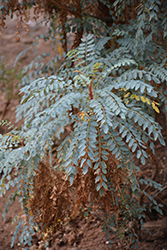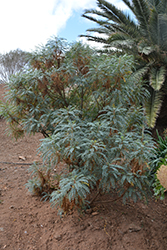Fri & Sat 8am - 8pm
Sun 8am - 7pm
Anytown, USA 12345
fax: 261.787.0463
e-mail: info@successgc.com


Plant Finder

Height: 12 feet
Spread: 8 feet
Sunlight:
![]()
![]()
Hardiness Zone: 9b
Description:
A stunning ornamental shrub or small tree presenting graceful pinnate blue-green leaves, on distinctive red stems; chartreuse or rose blooms from late spring to early fall, followed by brownish red seed pods; a unique garden accent or container plant
Ornamental Features
Stick of Blood is draped in stunning clusters of rose flowers with chartreuse overtones at the ends of the branches from late spring to early fall. It has attractive bluish-green foliage with hints of silvery blue which emerges light green in spring. The oval pinnately compound leaves are highly ornamental and remain bluish-green throughout the winter. The fruits are showy brick red pods which fade to brown over time, which are carried in abundance from early fall to early winter. The fruit can be messy if allowed to drop on the lawn or walkways, and may require occasional clean-up. The rough brown bark and scarlet branches are extremely showy and add significant winter interest.
Landscape Attributes
Stick of Blood is a multi-stemmed evergreen shrub with an upright spreading habit of growth. Its relatively fine texture sets it apart from other landscape plants with less refined foliage.
This shrub will require occasional maintenance and upkeep, and is best pruned in late winter once the threat of extreme cold has passed. Deer don't particularly care for this plant and will usually leave it alone in favor of tastier treats. Gardeners should be aware of the following characteristic(s) that may warrant special consideration;
- Self-Seeding
Stick of Blood is recommended for the following landscape applications;
- Accent
- Rock/Alpine Gardens
- General Garden Use
- Container Planting
Planting & Growing
Stick of Blood will grow to be about 12 feet tall at maturity, with a spread of 8 feet. It has a low canopy with a typical clearance of 2 feet from the ground, and is suitable for planting under power lines. It grows at a medium rate, and under ideal conditions can be expected to live for 40 years or more. This is a dioecious species, meaning that individual plants are either male or female. Only the females will produce fruit, and a male variety of the same species is required nearby as a pollinator.
This shrub does best in full sun to partial shade. It needs very dry, well-drained conditions for optimal growth. This plant does not require much in the way of fertilizing once established. It is not particular as to soil pH, but grows best in sandy soils. It is somewhat tolerant of urban pollution. This species is not originally from North America.
Stick of Blood makes a fine choice for the outdoor landscape, but it is also well-suited for use in outdoor pots and containers. Its large size and upright habit of growth lend it for use as a solitary accent, or in a composition surrounded by smaller plants around the base and those that spill over the edges. It is even sizeable enough that it can be grown alone in a suitable container. Note that when grown in a container, it may not perform exactly as indicated on the tag - this is to be expected. Also note that when growing plants in outdoor containers and baskets, they may require more frequent waterings than they would in the yard or garden.

